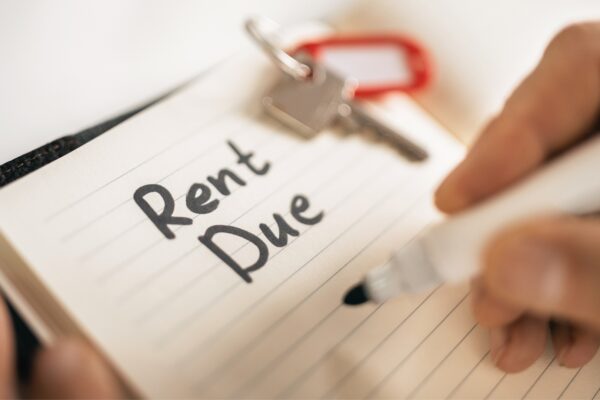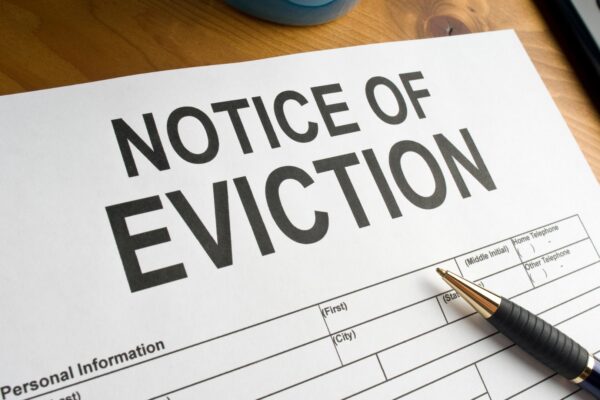No landlord likes tenants falling behind with their rent. The problem is particularly disruptive for landlords who use their rental income to make regular pension contributions, or use the income for regular living costs.
The best way for landlords to handle rent arrears isn’t to assert their rights via the courts or evict their tenants. It is to prevent late rent payments in the first place.
Landlords Rights to Tackle Rent Arrears in England
In general, there are two things a landlord can do if a tenant gets into arrears. Firstly, they can evict the tenant and replace them with a tenant who (they hope) will pay on time. Secondly, they can try and get the owed money from the tenant via the courts.
Evicting a tenant for rent arrears can be done via a Section 8 eviction notice. It usually requires the tenant to be in over two months of arrears and there is a detailed process you need to follow. While applying to court for a repossession order, you can also apply for the court to rule that the tenant must pay any owed rent. You will then need to follow this up with the N1 Claim Form, and reference the judge’s ruling.
If this is a route you are considering, you can read our detailed guide to evicting a tenant for rent arrears here. It is obvious, however, that evicting a tenant and trying to recover lost rental income is a long, complex and expensive process. And it is much better to simply avoid arrears in the first place.
Tips for Landlords to Prevent Rent Arrears
While the rate of late rent payments in the UK is generally low, landlords don’t have to be passive and hope for the best. There several things landlords can do to minimise their exposure to late rent and arrears building up through their tenancy, without having to use their landlord rights to pursue money through the courts.
Ask your tenants to set up a standing order
While some arrears are deliberate or due to affordability, some are simply due to disorganisation and poor money management. Some tenants may miss rent payments because they forget to pay or they aren’t paid monthly salaries.
If you are paying your rental income into a monthly pension fund or using it for living costs, this can be very disruptive to your cash flow. The best thing to do is to ask your tenant to set up a standing order from their bank account to the one you use to collect rent, due a few days before the rent due date each month. You can offer them a small rent discount if they send you proof that they set up the order.
Although it is easy to cancel a standing order, it is unlikely a tenant who genuinely intends to pay the rent each month would do so, and it will prevent them from forgetting to make the payment manually each month. The small discount will encourage them to get on board with the idea and keep your cash flow regular.
Our rent collection service chases your tenants for rent automatically, helping them pay on time every month.
Set up tenancy with OpenRentOrder tenant referencing
There are many reasons that a tenant might not pay their rent on time, but being unable to comfortably afford the rent is one of the most important causes of arrears. Unfortunately, due to a lack of affordable housing in many areas, tenants may be forced to apply to homes they can’t comfortably afford due to the imminent risk of becoming homeless.
Ordering a tenant referencing report will enable you to avoid letting to tenants who won’t be able to afford the rent, since all referencing reports include an affordability check. This is a calculation which determines if the tenant’s income is high enough for them to afford the monthly rent with plenty to spare. If the tenant fails, then you should have concerns about their ability to pay the rent on time every month.
Find out more about what is included in tenant referencing reports.
Add a guarantor to the contract
The main value of adding a guarantor is that guarantors are liable for rent arrears should they arise. Adding a guarantor means adding another person who may be able to pay the rent if required.
This is certainly useful for landlords whose tenants run into arrears. Often, a letter to a guarantor explaining that the tenancy is now in arrears because the tenant is late with the rent will result in the payment being made. But aside from being another source of rent money, guarantors serve another role that is talked about less often.
Having a guarantor means that if the tenant doesn’t pay the rent, they could get someone they are close to into trouble. Guarantors and tenants are usually family or friends. While very few tenants take arrears lightly, it is much easier to take a risk with non-payment of rent if you know it only affects you and your credit history. If you know that it will affect your family, as well, then that is just one more serious reason to ensure you pay on time.
Take rent in advance
The convention in the UK is that all rent is paid in advance of the relevant rental period. For example, in a monthly tenancy, the rent for October is usually paid in September.
But landlords can also collect the rent for multiple rental periods in advance. The most common way to do this is at the beginning of a tenancy. For example, six months of rent can be paid at the beginning of the tenancy, meaning the tenant doesn’t need to pay again until six months into the tenancy. At this point they might pay monthly, or pay another several months in one go.
Being paid multiple months in advance at the beginning of the tenancy means it is impossible for the tenants to fall into arrears during those months, since they will already have paid. Although some tenants will not want, or be able, to pay several months in advance, it will suit some tenants. The higher the demand for your property, the more likely you will be able to find a tenant who is happy to do this.
Keep communications open
If your tenant is self-employed, doesn’t have a monthly salary or claims benefits, then their income may vary from month to month depending on a variety of factors they can’t completely control. As a landlord you would like to know about this before the rent is due. If you maintain your tenant relationship, then they will feel comfortable telling you if they expect their income to change, and you can both plan accordingly.
If a tenant gives you a polite notice that they may be late with, or struggle to pay, the rent, then it is important to not to discourage them from being so upfront and helpful. If your response is angry or hostile, then they will simply stop talking to you. This is not what you want.
If you have good communication, then you can decide how best to proceed. If the tenant thinks this is only a temporary issue that won’t last long, then it is probably best to give them the benefit of the doubt and support them in the short term.
If, however, the tenant has lost their source of income and can no longer afford to pay the rent going forward, then you may decide to begin a discussion to mutually surrender the tenancy, so that the tenant doesn’t get into debt and you are free to find a new tenant who will be able to pay. None of this will be possible unless you work at keeping a good relationship with your tenant, and encourage them to communicate when their circumstances change.




Start the discussion at community.openrent.co.uk